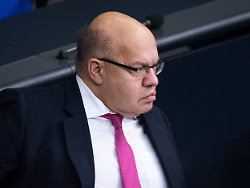Tuesday, December 15, 2020
Ministry supervision
Altmaier reforms DIHK after judgment
An entrepreneur complains about statements made by the DIHK. At the end of the court process, his local Chamber of Commerce and Industry may leave the umbrella organization. The consequences are massive: more requests to leave will follow, the financing could be in jeopardy and the right to representation as well.
Federal Minister of Economics Peter Altmaier wants to stabilize the German Chamber of Commerce and Industry (DIHK) and eliminate uncertainties after a court ruling. Legal changes are planned for this, as can be seen from a draft. Accordingly, a reorganization of the structure of the chamber representation at federal level is planned. Specifically, a German Chamber of Commerce and Industry is to be set up by transforming the German Chamber of Commerce and Industry (DIHK) into a corporation under public law. This means that this federal chamber will in future be subject to the legal supervision of the Federal Ministry of Economics. In future, the ministry will be able to check whether the DIHK is moving within the scope of its competencies.
In addition, statutory membership of all chambers of industry and commerce in the Federal Chamber is planned. There should be a transition phase of four years, as can be seen in the draft amendment to the law on the provisional regulation of the law of chambers of industry and commerce. The draft was submitted to the German Press Agency.
Groundbreaking judgment
The Federal Administrative Court in Leipzig had ordered the IHK North Westphalia to leave the DIHK after a dispute lasting 13 years. According to the court, the reason for this was statements made by the umbrella organization outside its area of competence on general political issues as well as one-sided questions of environmental and climate policy. An entrepreneur from the wind energy industry from Münster, who is himself a member of the IHK North Westphalia, took legal action. The member of the IHK concerned had already tried since 2007 through all judicial instances to obtain the withdrawal of his Chamber of Commerce from the DIHK, because the latter had regularly and unilaterally commented on general political issues such as climate protection.
After an initial ruling in 2016, the Federal Administrative Court again found him right in mid-October and objected to the general political activities of the DIHK. According to the Federal Association for Free Chambers, five members in the IHK districts of Munich, Stuttgart, Cologne, Bielefeld and Kassel have initiated urgent proceedings to force these IHKs to leave the DIHK. There are 79 chambers of industry and commerce in Germany.
"Economically indispensable"
The draft law states that with the withdrawal of the IHK North Westphalia, the activities of the DIHK e.V. are no longer complete at the federal level. If further terminations followed, the representation of the general interests of the IHKs at national, European and international level by the DIHK is more possible. The financing of the DIHK is also no longer guaranteed. The interests of the approximately four million chamber members could then no longer be represented in their entirety at the federal or international level. That is "economically indispensable".
A spokeswoman for the Ministry of Economic Affairs said: "With the draft of a law amending the IHK law, we want to ensure legal certainty quickly after the judgment of the Federal Administrative Court." Statements on climate protection, human rights or Brexit that were not covered by the previous law would thus be possible in the future. The aim of the change in law is to maintain an umbrella association of the IHKs, as a single point of contact at the federal level and as a representative of the interests of German medium-sized companies at the European level.
From the DIHK it was said that the aim of eliminating legal uncertainties and contradictions with clear rules is in the interests of all parties involved: the IHK member companies as well as the voluntary entrepreneurs in the IHKs and the DIHK. This gives the entire chamber organization and its 3.6 member companies the necessary stability, which is necessary in the currently difficult phase.
After the ruling, the DIHK announced that it would no longer express itself in public for the time being, regardless of the reason. Accordingly, in a letter to the IHKs, there will be no more press releases and conferences, interviews or panel discussions for the time being. However, the DIHK intends to further develop statements and position papers on "legislative procedures affecting the commercial economy" and political decisions, as the letter says.
. (tagsToTranslate) Economy (t) DIHK (t) Economy (t) Federal Ministry of Economics (t) Federal Administrative Court
